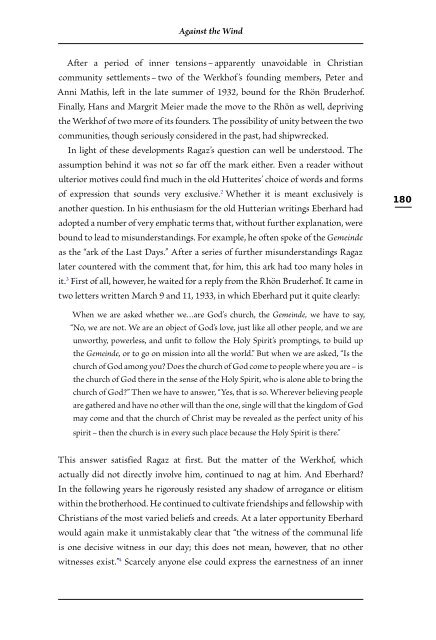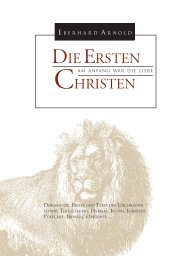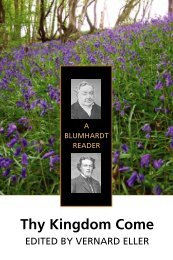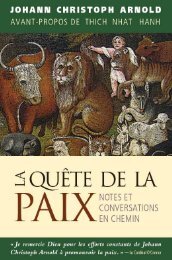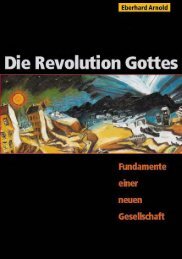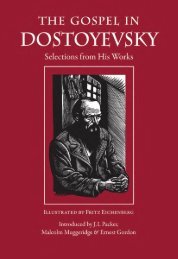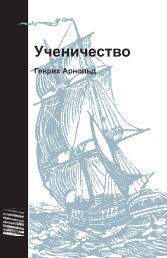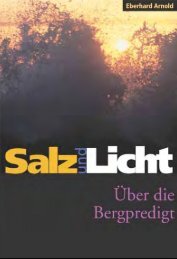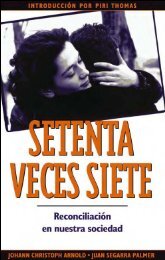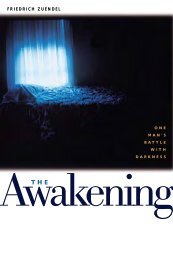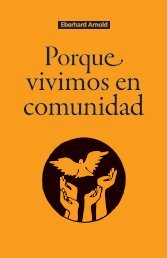Against the Wind: Eberhard Arnold and the Bruderhof - Plough
Against the Wind: Eberhard Arnold and the Bruderhof - Plough
Against the Wind: Eberhard Arnold and the Bruderhof - Plough
Create successful ePaper yourself
Turn your PDF publications into a flip-book with our unique Google optimized e-Paper software.
<strong>Against</strong> <strong>the</strong> <strong>Wind</strong>After a period of inner tensions – apparently unavoidable in Christiancommunity settlements – two of <strong>the</strong> Werkhof ’s founding members, Peter <strong>and</strong>Anni Mathis, left in <strong>the</strong> late summer of 1932, bound for <strong>the</strong> Rhön <strong>Bruderhof</strong>.Finally, Hans <strong>and</strong> Margrit Meier made <strong>the</strong> move to <strong>the</strong> Rhön as well, depriving<strong>the</strong> Werkhof of two more of its founders. The possibility of unity between <strong>the</strong> twocommunities, though seriously considered in <strong>the</strong> past, had shipwrecked.In light of <strong>the</strong>se developments Ragaz’s question can well be understood. Theassumption behind it was not so far off <strong>the</strong> mark ei<strong>the</strong>r. Even a reader withoutulterior motives could find much in <strong>the</strong> old Hutterites’ choice of words <strong>and</strong> formsof expression that sounds very exclusive. 2 Whe<strong>the</strong>r it is meant exclusively isano<strong>the</strong>r question. In his enthusiasm for <strong>the</strong> old Hutterian writings <strong>Eberhard</strong> hadadopted a number of very emphatic terms that, without fur<strong>the</strong>r explanation, werebound to lead to misunderst<strong>and</strong>ings. For example, he often spoke of <strong>the</strong> Gemeindeas <strong>the</strong> “ark of <strong>the</strong> Last Days.” After a series of fur<strong>the</strong>r misunderst<strong>and</strong>ings Ragazlater countered with <strong>the</strong> comment that, for him, this ark had too many holes init. 3 First of all, however, he waited for a reply from <strong>the</strong> Rhön <strong>Bruderhof</strong>. It came intwo letters written March 9 <strong>and</strong> 11, 1933, in which <strong>Eberhard</strong> put it quite clearly:180When we are asked whe<strong>the</strong>r we…are God’s church, <strong>the</strong> Gemeinde, we have to say,“No, we are not. We are an object of God’s love, just like all o<strong>the</strong>r people, <strong>and</strong> we areunworthy, powerless, <strong>and</strong> unfit to follow <strong>the</strong> Holy Spirit’s promptings, to build up<strong>the</strong> Gemeinde, or to go on mission into all <strong>the</strong> world.” But when we are asked, “Is <strong>the</strong>church of God among you? Does <strong>the</strong> church of God come to people where you are – is<strong>the</strong> church of God <strong>the</strong>re in <strong>the</strong> sense of <strong>the</strong> Holy Spirit, who is alone able to bring <strong>the</strong>church of God?” Then we have to answer, “Yes, that is so. Wherever believing peopleare ga<strong>the</strong>red <strong>and</strong> have no o<strong>the</strong>r will than <strong>the</strong> one, single will that <strong>the</strong> kingdom of Godmay come <strong>and</strong> that <strong>the</strong> church of Christ may be revealed as <strong>the</strong> perfect unity of hisspirit – <strong>the</strong>n <strong>the</strong> church is in every such place because <strong>the</strong> Holy Spirit is <strong>the</strong>re.”This answer satisfied Ragaz at first. But <strong>the</strong> matter of <strong>the</strong> Werkhof, whichactually did not directly involve him, continued to nag at him. And <strong>Eberhard</strong>?In <strong>the</strong> following years he rigorously resisted any shadow of arrogance or elitismwithin <strong>the</strong> bro<strong>the</strong>rhood. He continued to cultivate friendships <strong>and</strong> fellowship withChristians of <strong>the</strong> most varied beliefs <strong>and</strong> creeds. At a later opportunity <strong>Eberhard</strong>would again make it unmistakably clear that “<strong>the</strong> witness of <strong>the</strong> communal lifeis one decisive witness in our day; this does not mean, however, that no o<strong>the</strong>rwitnesses exist.” 4 Scarcely anyone else could express <strong>the</strong> earnestness of an inner


